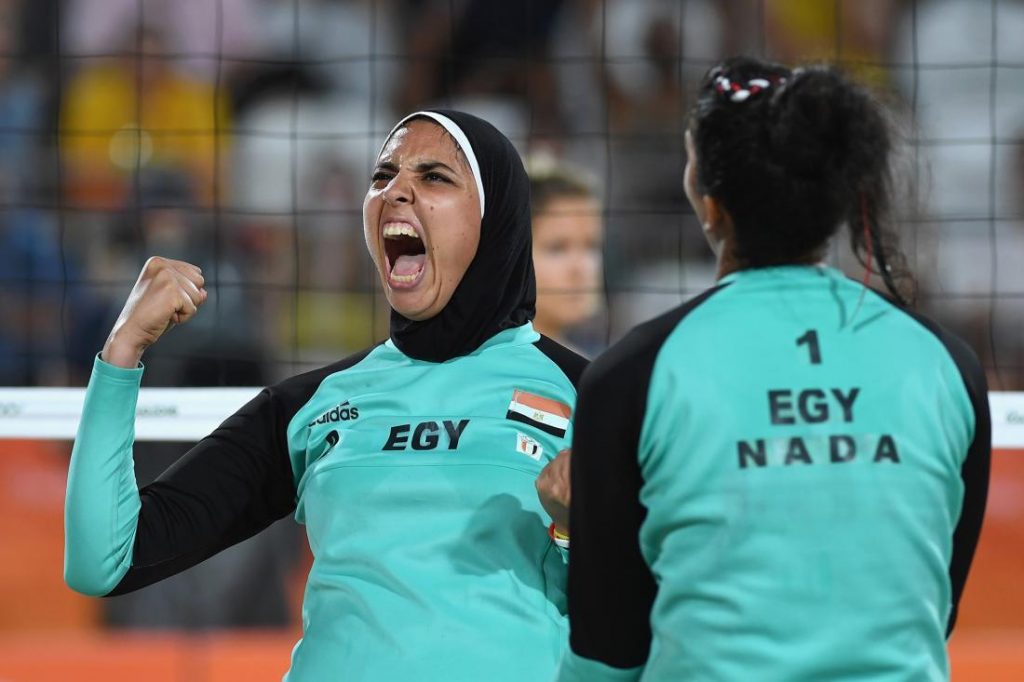by Hira Uddin
With the International Basketball Federation (FIBA) imposing a ban on headscarves for female athletes and Cannes’ recent ban on the “Burqini,” a full bodysuit Muslim women wear while swimming, I often find myself asking, “What is so threatening about letting a woman cover her body?”
Society often fights for the rights of women to expose our bodies if we so choose, however, the same cannot be said regarding protecting the right of a woman who wants to cover her body. Maybe it’s the fact she doesn’t find satisfaction in gaining approval of the male gaze. Perhaps, she wants others to focus on her accomplishments, personality, and personal calling – as in the case of many female Muslim athletes competing in the 2016 Olympics in Rio de Janeiro, Brazil.
For these female Olympians representing Islamic countries like Egypt, Saudi Arabia, Palestine, and Somalia just to name a few, the opportunity to compete alongside other countries is about more than bringing home the gold.
Visibly Muslim athletes like Maryan Nuh Muse of Somalia, Ibtihaj Muhammad of USA, and Doaa el-Ghobashy of Egypt, are not only representing their respective countries but they are also the personification of the dreams of young Muslim girls across the globe who have been told in different languages “you aren’t good enough” and “you can’t achieve because (insert condescending patriarchal “mansplaining” here).”
The sad reality is much of the world has a distorted understanding of Muslim women. They are deliberately depicted in the media as “oppressed” with stifled identities and rarely portrayed as embracing their headscarves and the modest clothing they actively choose to wear. Seldom is the term “hijab” associated with a positive connotation in the mouths of western politicians and biased news anchors; however, seeing female Muslim Olympians wear their hijabs with pride is extremely refreshing.
In fact, when commentators discussed the beach volleyball match between Egypt and Germany, there was more focus on Doaa el-Ghobashy and her fellow teammates for covering their bodies as opposed to the validation of their athletic prowess and diligent training as Egypt’s first Olympic volleyball team. Instead of acknowledging that upholding Islamic values of dress and modesty did not prevent el-Ghobashy and her teammates from competing, the commentary continued to focus on the excess of clothing without giving proper merit to the women representing Egypt.
The juxtaposition of the fully clothed el-Ghobashy going head to head with her German opponent serves as both a literal and metaphorical testament allowing women to compete while wearing a uniform they are comfortable with allows everyone involved the right and the opportunity to compete, and there is in no way any hindering to one side or the other if the athletic federation allows Muslim women to compete in headscarves. Are you taking notes, FIBA?
Wearing a headscarf should not be the reason a well qualified and trained female athlete is robbed of the opportunity to compete and pursue her dreams. Rather, it should be an impetus to allow women who are not traditionally represented in this arena to compete so that the true potential of all athletes can be seen and identified with.
Whether others recognize Muslim women’s ability to compete and participate in sports or not, Muslim women are continuing to pave the way to honor their faith simultaneously with their athletic passions.
One such brand aiming to provide Muslim women comfortable clothing options in tune with modest principles promoted by Islam is Sukoon Active, founded by Arshiya Kherani. Inspired by the lack of availability in the market of modest activewear, Kherani founded Sukoon Active to make Islamically conscious clothing accessible to other Muslim women who did not want to sacrifice their modesty while simply working out or competing on a larger scale.
Kherani expressed her thoughts as a pioneer in this emerging market for Muslim women activewear:
It is incredible to watch and celebrate athletes like Ibitihaj Muhammad and Doaa Elghobashy make history while competing in this year’s Olympics. Not only do they represent their own teams and countries with pride, but they also embody a generation of women that challenges the norm of what it looks like to be a Muslim woman in 2016.
We believe it’s important for the world to recognize that wearing a hijab doesn’t make it any less important to take care of your body, to uphold your values, and to pursue your dreams. These things go hand in hand. For women who wear a hijab, putting on a hijab in the morning is just as essential as putting on a shirt or pants. And yet, we have athletes like Bilqis Abdul Qaadir and Indira Kaljo, who are banned from professional basketball by FIBA because they wear a hijab… the greatness in their stories is on hold because the world has not yet embraced global standards around inclusive fashion. As a brand, Sukoon is excited to create activewear solutions that empower women from all walks of life to fulfill their passion for sports while upholding their faith.
Going back to answering the question “What is so threatening about letting a woman cover her body?” it is important to remember the ideals to dignify women of color in ways they seem fit often are confronted with opposition. Allowing Muslim women to compete just as any other athlete would mean these women do have the agency and rights afforded to them by their own countries and it will empower others who look like them and share their ideals to send a positive message.
Perhaps it’s the dismantling of the ignorant concept Muslim women do not have rights within Islam and they are in some way oppressed; but there will be more Doaa el-Ghobashys, Ibtihaj Muhammads, and Indira Kaljos who will fight for their right to be seen as equals even when all the odds are stacked against them. Anyone who is different and marginalized can find solace in the fact that there is someone similar to their experiences representing and breaking down barriers on their behalf.
 Hira Uddin currently works as an Early Intervention Specialist. She is the editor of Inside American Mosques, a blog dedicated to fighting Islamophobia by educating others on what really happens in American Mosques.
Hira Uddin currently works as an Early Intervention Specialist. She is the editor of Inside American Mosques, a blog dedicated to fighting Islamophobia by educating others on what really happens in American Mosques.





